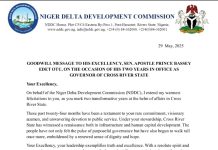
By Efio-Ita Nyok |16 June 2015 | 6:12am
During their 2015 general elections campaign, the All Progressives Congress(APC) and her presidential and vice presidential candidates, Mohammadu Buhari and Yemi Osinbajo respectively (now both President and Vice President) had promised Nigerians that should they be voted into power, they would pay unemployment benefits to the poorest Nigerians to the tune of N5,000 monthly.
During the weekend, Vice President Yemi Osinbajo at the 10th Year Anniversary Lecture of Crescent University, Abeokuta, Ogun State reiterated their campaign promise. In his words,
“One of the most striking promises we made during the campaign was the payment of Five Thousand Naira to the poorest Nigerians across the country”, he further noted that government is,
“currently evaluating the best ways to collapse existing cash transfer and social welfare schemes to
ensure consistency and alignment… Once this is completed, we will implement the first phase of this program, using recognized
identification platforms and transparent payment solutions”.
While this may be perceived to be a laudable programme, Negroid Haven has thought it wise to react against such a move by the FG in the ultimate interest of Nigerians. On the first note, the error with this programme is the fact that it fails to identify what is the underlying cause(s) of poverty. Why do we have poor Nigerians? It has been revealed that, “about 112 million (66% of
Nigerians) are deemed extremely poor, measured by World Bank parameter of those living on less than US$1.25 per day.”. The succeeding inquiry becomes, are these 66% of Nigeria's population poor because government failed to provide employment opportunities? Or, are they poor because they are less educated/skillful? The popular response would be in the affirmative of the fact that government has failed to provide employment opportunities. But I beg to defer with this popular notion.
The challenge with Nigeria's 112 million poorest is that the form of education obtainable in our institutions of learning are such that ingrain the 'employee mentality' in the consciousness of Nigerians instead of churning out an entrepreneurial orientation. That is, we have some many 'job seekers' instead of 'job creators' coming out from our institutions of learning. And herein lies the problem.
This call to memory the popular Chinese proverb that contend that, 'Do not give me fish, rather teach me how to catch fish'. In this context, we have 112 million Nigerians(out of 170 millions) who are to be fed with fish, who cannot catch their fish. So, what the federal government should rather do is to identify the reason leading to poverty and not falling prey to the sentiments of social benefits. The FG should rather plough the billions/trillions that would go into social benefits in re-engineering the minds of these 65%.
Put differently, that the World Bank reports that 65% of Nigeria's population is living below the poverty line of $1.25 a day, should be interpreted to mean that 112 million Nigerians aren't skillful in 'catching their own fish'. It shouldn't be thought that they are eligible for social benefits of any kind. They are rather eligible for an entrepreneurial re-engineering. We should not re-enforce the employee consciousness of 112 million Nigerians. It would be a bad policy at the center. They are only poor in mind but not poor in 'cash'.









